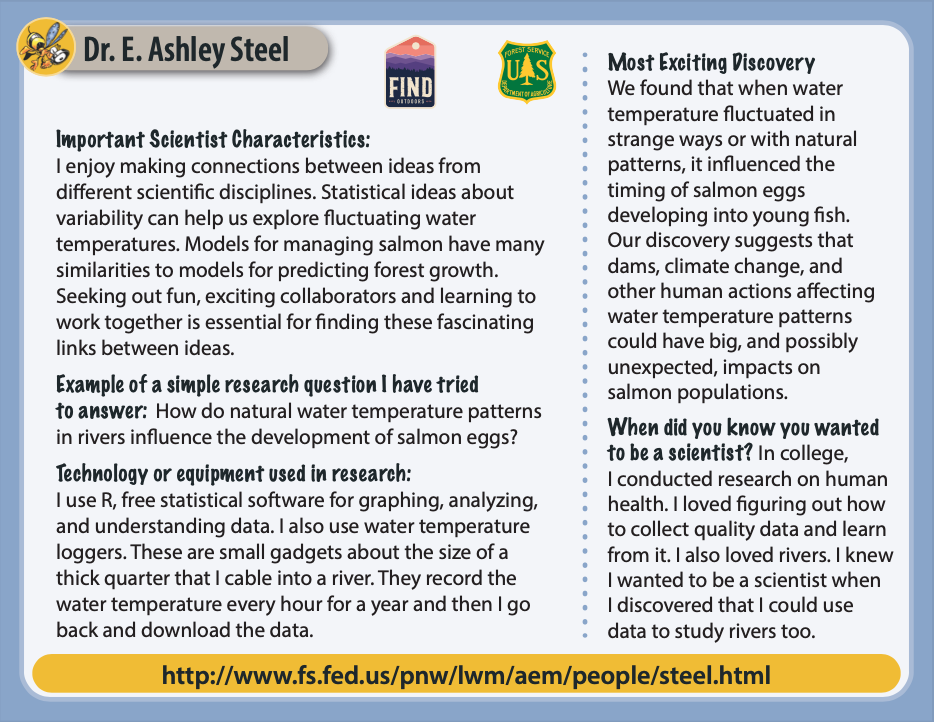Forests & Plants


Ted Weller, Ecologist
Forests & PlantsWildlife
- M.S., Humboldt State University
- USDA Forest Service Scientist
- An ecologist studies the interaction between animals, their environment, and the weather. In my work, I study how those interactions change among seasons.
- M.S., Humboldt State University
- USDA Forest Service Scientist
- An ecologist studies the interaction between animals, their environment, and the weather. In my work, I study how those interactions change among seasons.


E. Ashley Steel, Quantitative Ecologist
Forests & PlantsWaterWildlife
- Ph.D., University of Washington-Seattle
- USDA Forest Service Scientist
- A quantitative ecologist uses mathematical skills and ideas to better understand forests, rivers, oceans, fish, wildlife, climate, and more.
- Ph.D., University of Washington-Seattle
- USDA Forest Service Scientist
- A quantitative ecologist uses mathematical skills and ideas to better understand forests, rivers, oceans, fish, wildlife, climate, and more.


Ms. Yvette Ortega, Ecologist
Forests & PlantsWildlife
- University of California, Berkeley
- USDA Forest Service Scientist
- An ecologist studies how plants, animals, and nature’s forces interact.
- University of California, Berkeley
- USDA Forest Service Scientist
- An ecologist studies how plants, animals, and nature’s forces interact.


Dede Olson, Research Ecologist
Forests & PlantsWildlife
- Oregon State University
- USDA Forest Service Scientist
- I study potential threats to animal populations, especially amphibians and reptiles, including disease and habitat alteration from forest management. I also study general ecology such as species distributions, habitat associations, movements, and breeding.
- Oregon State University
- USDA Forest Service Scientist
- I study potential threats to animal populations, especially amphibians and reptiles, including disease and habitat alteration from forest management. I also study general ecology such as species distributions, habitat associations, movements, and breeding.


Kevin McKelvey, Ecologist
Forests & PlantsWildlife
- University of Florida
- USDA Forest Service Scientist
- Ecology is the study of interactions between organisms and their environment. I primarily study animals.
- University of Florida
- USDA Forest Service Scientist
- Ecology is the study of interactions between organisms and their environment. I primarily study animals.


Steve Matthews, Wildlife Landscape Ecologist
Forests & PlantsWildlife
- Ph.D., Ohio State University
- USDA Forest Service Scientist
- A landscape ecologist studies how different land uses influence and shape ecological communities. I am particularly interested in how birds and forests respond to a changing environment.
- Ph.D., Ohio State University
- USDA Forest Service Scientist
- A landscape ecologist studies how different land uses influence and shape ecological communities. I am particularly interested in how birds and forests respond to a changing environment.


Susan Loeb, Conservation Biologist
Forests & PlantsWildlife
- Ph.D., University of California, Davis
- USDA Forest Service Scientist
- Conservation ecology is the study of plants and animals in their natural and human-impacted environments to determine what they need to maintain healthy populations.
- Ph.D., University of California, Davis
- USDA Forest Service Scientist
- Conservation ecology is the study of plants and animals in their natural and human-impacted environments to determine what they need to maintain healthy populations.


Christina Liang, Ecologist
Forests & PlantsWildlife
- Ph.D., University of California-Davis
- USDA Forest Service Scientist
- An ecologist studies the interactions between living things and their environment. The environment includes the physical environment such as climate, water, and soil as well as biological environment such as other living things.
- Ph.D., University of California-Davis
- USDA Forest Service Scientist
- An ecologist studies the interactions between living things and their environment. The environment includes the physical environment such as climate, water, and soil as well as biological environment such as other living things.


Susannah Lerman, Research Ecologist
Forests & PlantsWildlife
- Ph.D., University of Massachusetts
- USDA Forest Service Scientist
- As an urban wildlife ecologist, I study how animals in cities interact with their habitat and how people interact with their local wildlife.
- Ph.D., University of Massachusetts
- USDA Forest Service Scientist
- As an urban wildlife ecologist, I study how animals in cities interact with their habitat and how people interact with their local wildlife.


Serra J. Hoagland, Biological Scientist
Forests & PlantsWildlife
- Ph.D., (student) Northern Arizona University
- USDA Forest Service Scientist
- Biological scientists study many different types of organisms from endangered birds to large predators. We study wildlife populations and their habitat to help conserve them for future generations!
- Ph.D., (student) Northern Arizona University
- USDA Forest Service Scientist
- Biological scientists study many different types of organisms from endangered birds to large predators. We study wildlife populations and their habitat to help conserve them for future generations!



